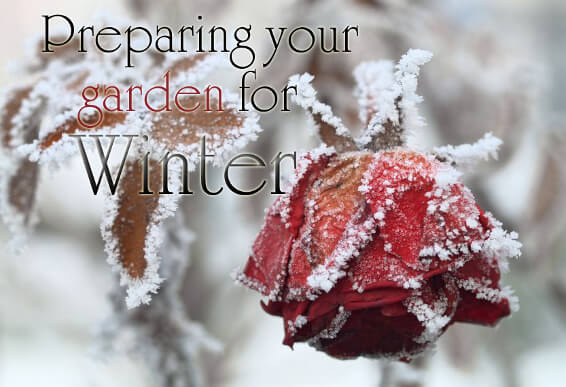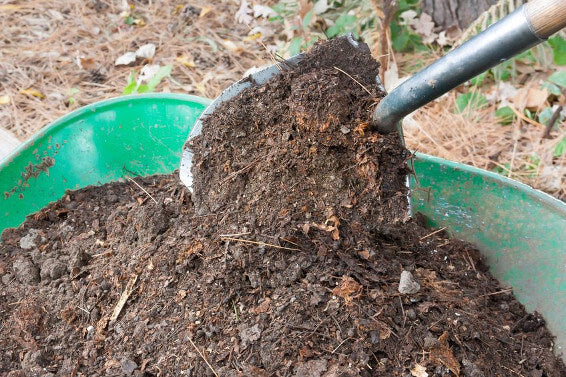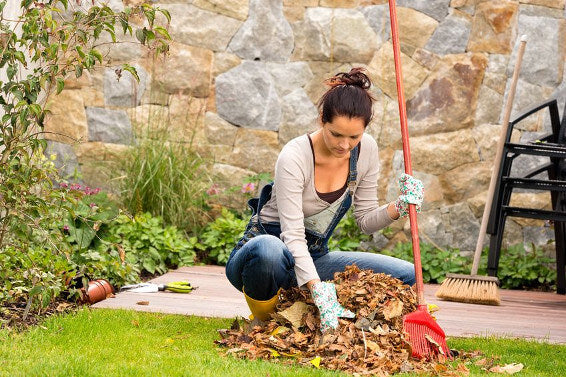
If you haven't started preparing your garden for winter, never fear, it's not too late! This is a guest post from Jo Rellime, our friend over at the Homestead Chronicles, and she has graciously shared her knowledge with us.
Why is cleaning up the garden so important?
It's a critical step in organic weed, fungus, and insect control and the retention of nutrients, moisture, and heat. Gardening (like anything else in nature) is cyclical. It never begins and it never ends. What you do (or don't do) in the fall has a direct effect on what you will deal with in spring and summer. Just because the harvest is in and the nights are in the thirties doesn't mean you get to walk away. To minimize your work later you make an investment now. Sometimes, it seems like gardening is like trying to nail Jell-O to a tree, but it doesn't have to be that way. It's like raising a kid, you can't skip steps just because you are not in the mood. Get out there and clean up your garden, get it ready for winter, and MULCH it. You will be glad you did.
What's the best way to prepare your garden for the winter?

MULCH, MULCH, MULCH! Here are the steps we follow:
- Remove (and save for next year) all plant markers and other non-organic materials including trellises, bamboo poles, and temporary fences.
- All leftover weeds (especially if there are seeds involved) are removed but not composted (you don't want weed seeds in your compost.)
- Leftover non-weed plant matter can either be used as mulch or composted, so long as it was not infected with anything like a fungus or a species of bug larvae. That gets put out to the curb for pick up.
- MULCH, MULCH, MULCH! But don't buy it! Use autumn leaves gathered from the yard, the neighbors yard, where ever you can get it. You need to be a bit careful here though because leaves can introduce fungi, microorganisms, and larvae that you may not expect and some are undesirable. Point is, make sure it's a disease- and bug-free blend. If you see ladybug or praying mantis eggs though, they can stay.
A thick layer of mulch before winter sets in protects bulbs and root veggies you are overwintering (like garlic, onions, carrots, or parsnips). It helps the soil to retain moisture, heat, and nutrients (so it doesn't wash away in the rain-think "erosion" on a small scale) and it discourages weed seeds from sprouting in the spring by robbing them of light and air, so MULCH the heck out of it. Did I mention you need to MULCH?
How do you prepare your perennials for winter?
It depends on what it is. Typically, herbs get cut back almost to the ground and heavily mulched with fall leaves. Berry bushes do not get cut back until late winter but they do get heavily mulched. My berries are all in pots, so I move the pots up close to the house to provide a windbreak and completely cover the pots and halfway up the bushes. If it's a fall/winter veggie like celery, kale, carrots, or cabbage I mulch first, place a hoop house over it, and then mulch all the way around it to keep the frost out. We don't really have a lot of perennials, though. Just the berries and herbs. Most of our garden veggies are annuals.
What are some tips you have about winter composting?

Composting is composting regardless of the weather, and in winter, the process does slow down significantly. It would take an arctic environment to almost stop the process, and even then, it still occurs even if it takes thousands of years. Things still rot at 20 degrees or 10 degrees, so yes, it takes a lot longer when it's cold, but if you have ever stuck something in the back of your fridge for 6 weeks and had it come out blue and furry, then you know cold does not stop the composting process. You know your compost is doing just fine when either the snow doesn't stick on the pile, or it's the very first thing to melt when it stops snowing. The compost is warm. Just keep feeding it and turning it (although maybe not quite as often). It's working; just very slowly.
How can you keep gardening, even through the winter?
It depends on your available resources. We have a spare bedroom set up as a grow room and light it with grow lights, and we keep a space heater in there to keep it a little warmer than the rest of the house, too. We also use heat mats underneath starter trays in January and February for starting seedlings. Of course, we carry our lemon trees, rosemary, and other plants (not suited to our zone) indoors and place them in sunny windows. Herbs are a great thing to grow in window sills, and they really cheer me up when I want to harvest something fresh for cooking. You can build hoop houses or cold frames to extend your growing season. Search on Google those for tons of great ideas that are low cost and easy to do.
What should gardeners research?
That depends on their goals, available space, gardening method (square foot, raised bed, etc), hardiness zone, and experience level. Inexperienced or novice gardeners should start with the basics: organic vs. non-organic, the difference between heirloom, hybrid, and non-GMO/GMO seeds, and your zone. You need to know your soil and know what grows well and what doesn't where YOU live. Once you have mastered that, move on to topics like compost & its role, basic troubleshooting (like diseases, fungus, and soil issues), soil issues (like pH levels, temps, moisture levels, and minerals or the lack thereof). As you mature as a gardener, get into specifics. For example, in the area of "knowing your soil," read up on how to amend your soil to increase or decrease pH and how to put simple things (like eggshells and coffee grounds) to use to increase nutrients.
Read up on the specific nutrients that plants either take from the soil or put back into it. Legumes (like beans & peas), for example, replenish nitrogen, but just growing them in a spot where nitrogen is needed is not enough. After harvest is done for the year, you have to cut the plant down at ground level and leave the roots in the soil. That is where the nitrogen is, and it's the form of little nodules attached to the roots. They act as a slow-release fertilizer, and if you yank those roots, you may as well not have bothered. Instead, till those roots in. This sort of information comes in one of two ways: 1) research and 2) apprenticeship. If you know an experienced gardener willing to teach you some things, jump on every opportunity to be mentored.


